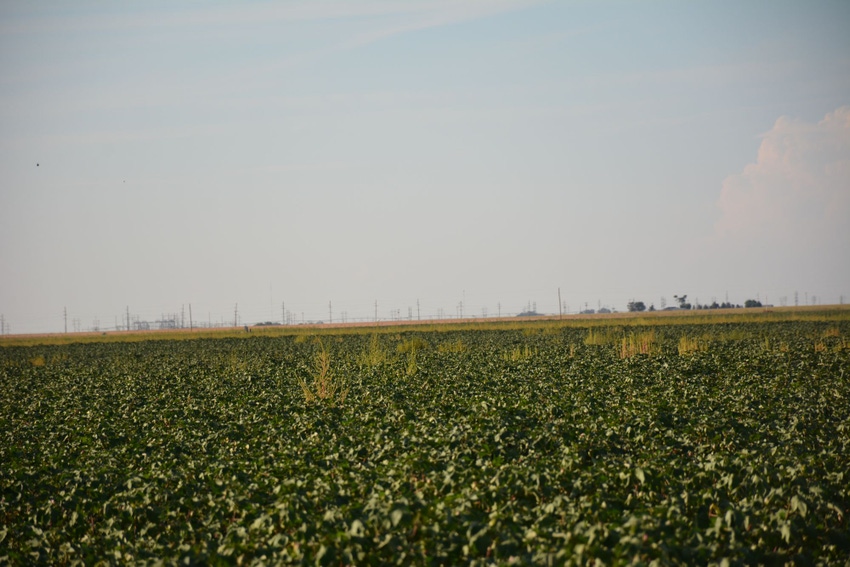
EPA has finally given approval for BASF’s Engenia herbicide after nearly four years of delays that saw some farmers lose patience and apply older formulations of dicamba – illegally – on their Xtend crops.
BASF announced the registration of its low-volatility Engenia formulation right before Christmas, noting the herbicide will control more than 200 broadleaf weeds, including glyphosate-resistant species, in dicamba-tolerant cotton and soybeans.
“Growers across the Midwest and southern U.S. have been eagerly awaiting approval of this new dicamba-tolerant chemistry as seen by the support of the vast majority who provided feedback during the EPA commentary period,” the company said, noting EPA considered 22,000 comments submitted by growers, researchers and academic experts and other stakeholders.
Although dicamba formulations weren't labeled for over-the-top application on crops until now, farmers could plant crops with traits that made them resistant to the herbicide in 2016. The "out-of-sync" authorization of the trait resulted in more than 100 complaints of off-target applications of dicamba formulations in Mid-South crops last summer.
BASF listed a number of benefits for the new Engenia herbicide, including it provides an additional, effective site of action for controlling Palmer amaranth and other problem weeds:
An advanced formulation, with a 70 percent reduction in volatility when compared to DGA dicamba.
The lowest use rate of all dicamba products on the market.
Added flexibility with the option for direct injection, which reduces the number of tank cleanouts and refills.
“Engenia herbicide is our most flexible and advanced dicamba for dicamba-tolerant crops,” said Neil Bentley, director of marketing for U.S. Crops, BASF. “It's a product that will help growers better manage weeds to get the most out of every acre.”
Two-thirds of U.S. farms
Weeds resistant to the glyphosate active ingredient have been identified on more than two-thirds of U.S. farm acres, totaling more than 61 million affected acres. Farmers currently are fighting 16 species of glyphosate-resistant weeds spread across 38 states, and research shows additional weed species are developing resistance to multiple sites of action.
“Glyphosate-resistant weeds are a serious and growing issue across the country,” said Chad Asmus, technical marketing manager, BASF. “Engenia herbicide is part of a complete weed management program that starts with a residual herbicide and utilizes multiple, effective sites of action to control even the toughest weeds.”
BASF studies indicate Engenia will be more effective than other herbicides for residual control of key broadleaf weeds, including waterhemp, common lambsquarter and Palmer amaranth and provide effective post-emergence control of many broadleaf weeds, including smartweed, kochia and cocklebur, as well as superior control of perennial weed Canada thistle.
And it will deliver more than 95 percent control of both grasses and problematic broadleaf weeds when combined with a BASF residual herbicide.
“The benefits of Engenia herbicide continue beyond weed control,” said Nathan Borgmeyer, senior marketing manager, BASF. “Engenia herbicide is compatible with direct injection technology, adding flexibility to applications and simplifying sprayer cleanout.”
On-Target Application Academy
BASF said the technology behind Engenia herbicide “contributes to the continued development of dicamba for effective, on-target applications and is the result of more than 50 years of BASF dicamba technical expertise.”
The company plans to continue to support growers through ongoing stewardship and education efforts, including: weed control best practices, resistance management, on-target application and other technical support, such as the On-Target Application Academy.
Launched in 2012, the On Target Application Academy offers growers, retailers and custom applicators field-based applicator training, in a one-on-one setting with BASF experts that focuses on proper application. Since the program started, more than 13,400 applicators across 31 states have participated in the stewardship training. An online version of OTAA will be made available by the end of this year.
For more information, visit http://agproducts.basf.us/campaigns/engenia/.
About the Author(s)
You May Also Like






